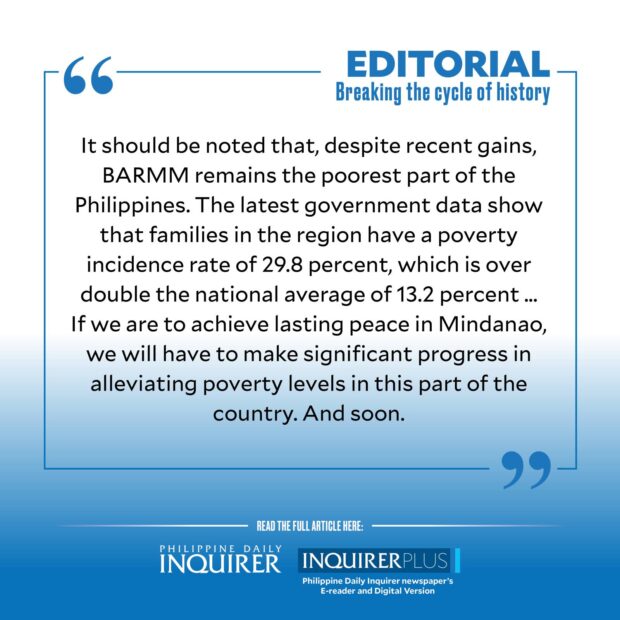Breaking the cycle of history
It is often said that good revolutionaries make for bad administrators.
In the Philippine context, there has certainly been ample evidence over the decades to support this assertion, especially when rebels against government return to the proverbial fold and are put in charge of implementing the peace they had sought to win through war.
To be clear, there is nothing to suggest that the Bangsamoro Autonomous Region in Muslim Mindanao (BARMM) is heading in this direction. But September is peace month and, if peace is to prevail, we should be guided by history which tells us that there are significant pitfalls on the rough road our leaders need to sidestep.
Peace is a long, arduous, and often frustrating journey, and helping bring the benefits of economic prosperity to all stakeholders is even more challenging. Fail in the former, and one should certainly expect to fail.
It should be noted that, despite recent gains, BARMM remains the poorest part of the Philippines. The latest government data show that families in the region have a poverty incidence rate of 29.8 percent, which is over double the national average of 13.2 percent.
According to the Philippine Statistics Authority, 37.4 percent of people in BARMM were poor as of the latest comprehensive survey done two years ago. This translates to 1.71 million poor families or those living below the poverty threshold.
The data showed that Basilan province recorded a poverty rate of 53.5 (that’s more than one in two); Lanao del Sur at 10.9 percent; Maguindanao at 38 percent; Sulu at 62.5 percent (almost two out of three); Tawi-Tawi recorded 36.5 percent while Cotabato City recorded 39.7 percent.
These stark numbers speak for themselves, sadly, and if we are to achieve lasting peace in Mindanao, we will have to make significant progress in alleviating poverty levels in this part of the country. And soon.
For things to progress, all stakeholders must balance idealism with pragmatism. And they must make sure these two important elements remain balanced for their efforts to be effective. Too much idealism may render them inflexible and ineffective, while too much pragmatism may make them corrupt.
Both extremes are wanting and can easily lead to the kind of frustration that makes people return to the ways of war. For proof, look no further than the predecessors of BARMM—the 1970s-era Lupong Tagapagpaganap ng Pook for Regions IX and XII, and the Autonomous Region in Muslim Mindanao—institutions that were founded on lofty ideals and run by idealists and former revolutionaries, many of whom ended up sorely disappointing their constituents by allowing themselves to be consumed by the very system they sought to change.
In 1976, the elder President Marcos put the country on a path to peace with the groundbreaking Tripoli Agreement which granted an early but imperfect version of autonomy for what was then a conflict-ridden Muslim Mindanao.
Today, almost five decades since, the younger President Marcos has a golden opportunity to bring that landmark deal to full fruition, by building on and perfecting the work that his presidential predecessors have done.
He should seize the moment and move all instrumentalities of government toward the goal of helping bring lasting peace and prosperity to a part of the country that has experienced so much conflict, hardship, and heartbreak.
Mr. Marcos should further empower institutions like the Office of the Presidential Adviser on Peace, Reconciliation, and Unity toward solving this multigenerational challenge while encouraging the private sector to generate employment and economic growth in the area. One particular area of BARMM’s economy that needs more work is improving the access of local entrepreneurs to funding—something that can be remedied through an aggressive push for Islamic finance, which was envisioned as early as the 1970s with the Al-Amanah Islamic Investment Bank of the Philippines, but poorly implemented.
It is also important to have law enforcement (which now includes many former rebels) ensure peace and order in this historically volatile part of the country.
Without the collective effort of all stakeholders, there’s always a danger that the billions of pesos in government funds and the billions of dollars in foreign assistance grants for this region will go to waste, as they did with BARMM’s predecessors.
The leaders of the Bangsamoros, too, should seize the moment by serving their people with utmost integrity and with all the substantial resources now at their disposal. If they succeed, we are all in for lasting peace and prosperity in Mindanao. If they fail, we could see history repeating itself.





















